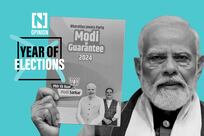LOS ANGELES // Jeff Bezos turned selling books online into a multibillion-dollar business that has changed retailing forever. Many are now anxious to see if Mr Bezos can do the same for the media industry, after the Amazon.com founder announced he is buying The Washington Post and other newspapers for US$250 million (Dh918m).
Yesterday's news of the sale to the 49-year-old pioneer of internet commerce came as a shock to observers, many of whom thought the Graham family - owners of the paper since 1933 - would never sell. It also sparked hope among the ranks of reporters beset by seemingly endless cutbacks.
"Jeff Bezos seems to me exactly the kind of inventive and innovative choice needed to bring about a recommitment to great journalism," said Carl Bernstein, whose co-reporting of the Watergate scandal that brought down President Richard Nixon in the 1970s cemented the newspaper's identity as a political watchdog.
But The Post, like most newspapers, has been losing readers and advertisers to the internet while watching its value plummet. The paper has cut its newsroom staff repeatedly in recent years and closed several bureaus.
Many see Mr Bezos, whose fortune was valued at $25 billion by Forbes magazine, as being rich enough to sustain the losses the newspaper will likely face over the next few years.
Mr Bezos is buying the newspaper as an individual. Amazon.com Inc. is not involved.
Mr Bezos said to Post employees in a letter distributed to the media that he'd be keeping his "day job" as Amazon CEO and a life in "the other Washington" where Amazon's headquarters are based in Seattle.
But he made clear there would be changes, if unforeseen ones, coming.
"The internet is transforming almost every element of the news business," Mr Bezos wrote. "There is no map, and charting a path ahead will not be easy. We will need to invent, which means we will need to experiment."
Mr Bezos said in a statement that he understands the Post's "critical role" in Washington and said its values won't change.
"The paper's duty will remain to its readers and not to the private interests of its owners," Mr Bezos said in his letter to Post employees.
The news surprised industry observers and even the newspaper's employees.
"Hard to imagine the Post without the Grahams," wrote East Asia Correspondent Chico Harlan in a tweet. "Don emailed his writers, knew their names."
To observers, the Amazon chief is eminently qualified to be a newspaper owner: He's rich, he's innovative and he's willing to live with slim profits. That's proven by his running of Amazon since its foundation. Last month, Amazon.com reported an unexpected loss in the April-June quarter even though revenue grew 22 per cent to $15.7 billion.
Alan Mutter, a media consultant and former newspaper editor, said this deal marks the first time a newspaper has been bought by a "digital native," not someone entrenched in the print medium.
"Here's a guy who's going to re-envision the newspaper from top to bottom and we'll see what we get," Mr Mutter said.
Newspaper revenue has shrivelled during the past eight years even as many publishers charged readers more for their print editions and began imposing fees for digital access, too.
The Post Co.'s newspaper division has swung from an annual operating profit of $125m in 2005 to an operating loss of $54m last year.
Readership of the print editions has also plummeted during the past decade. In 2002, The Washington Post's paid weekday circulation averaged nearly 768,000 copies, according to regulatory filings. By last year, the Post's weekday paid circulation had fallen to an average of just under 481,000, a 37 per cent drop.
Benchmark Co. analyst Ed Atorino said the recent sale of the Boston Globe and now The Washington Post demonstrate that some savvy business leaders still see hope for newspapers.
"Apparently there are people in this country who think these newspapers are worth saving and hope that advertising will eventually stabilise and they can begin to make money again," Mr Atorino said. "If the advertising doesn't come back, then game over."





